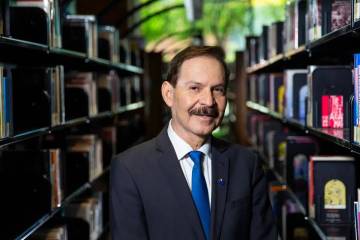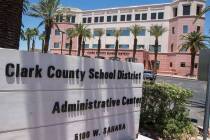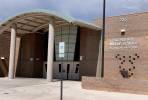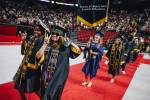School board requests $18 million for full-day kindergarten
Shaun Burnside is bracing for a monthly bill he never expected. One that might force his wife to work.
Kindergarten. Public school kindergarten. $375 a month.
“I find it completely ridiculous,” Burnside said. “It puts us into a financial bind.”
The California couple never had heard of such a thing as paying tuition for public school in addition to their taxes.
But then they moved to Las Vegas where less than half of the Clark County School District’s 217 elementary schools were funded for full-day kindergarten last school year.
Most schools either provided the minimum half-day kindergarten or were able to offer a whole day by charging parents, which covers the cost of the teacher. Allen Elementary School has offered full-day kindergarten for five years because of parents such as the Burnsides demanding it. In August, their son starts at the school near Ann Road and El Capitan Way.
Another 51 unfunded elementary schools also charged tuition last school year to offer optional full-day kindergarten.
Good news is on the way though.
The Legislature agreed this year to provide an extra $30 million to expand full-day kindergarten to 77 more Nevada schools in August, meaning 201 elementary schools will offer a full day of school, tuition-free.
And Clark County, teaching more than two-thirds of all Nevada students, is vying for the lion’s share of $18 million of the new money, according to a Clark County School Board grant request made Thursday. That would more than double the current funding, paying for full-day kindergarten at 146 schools compared to 92 schools last year out of 217 Clark County elementary schools.
“This move is unprecedented,” said Interim State Superintendent of Public Schools Rorie Fitzpatrick, emphasizing that it represents “a strong statement about the value of high quality early learning, and recognition of the return on investment that these programs will yield.”
But the promising news is bittersweet for the Burnside family and many other parents.
For the most part, the extra money won’t go to schools where parents are paying tuition, according to the district’s proposed list of schools to receive the extra funding.
Only five of the 52 schools currently charging tuition will receive state funding to cover the cost. That means the vast majority will still be charging, even though parents at these schools have made it clear that they want full-day kindergarten, according to District Chief Financial Officer Jeff Weiler.
The system is at fault.
Even though the Legislature approved full-day kindergarten in 2005, it hadn’t followed through with the funding to make it happen. Until now, lawmakers had provided only enough money to fund it in a small number of schools where the proportion of students qualifying for free or reduced-price lunches was highest.
The extra funding must go to the 54 poorest schools.
Schools where parents have demanded full-day kindergarten are schools with lower poverty rates, like Allen, where 18 percent of students qualify for free or reduced-price lunch compared with the 56 percent district average.
But that doesn’t mean parents like the Burnsides can sign a $3,375 check for the school year and shrug it off.
“We can’t really afford it, but we have to do it,” said Burnside’s wife, Jennifer. “They learn so much more.”
She is speaking from experience. Last school year, their other son was in full-day kindergarten at Allen. But, unable to afford the cost, they pulled him out two months into the school year. He went from attending school about 32 hours per week to just 16 hours.
“He ended up falling behind kids he was with or ahead of,” Burnside said.
District studies from 2004 to 2011 support Burnside’s anecdotal observations, according to district researcher Lisa Pitch, whose department looked for long-term effects of full-day kindergarten.
Researchers did this by comparing the students’ scores years later in third and fourth grade state tests for reading and math with those of the same school’s students whose parents didn’t pay for full-day kindergarten. On all tests, full-day students outperformed their half-day peers.
“Full-day kindergarten leads to markedly higher academic performance,” Pitch said. “Not only are they doing better in schools, you’re also saving money down the line.”
Full-day kindergarten can save the district and taxpayers, she said. Such children cost less to educate down the road, requiring less remediation and special programs to raise their skills to grade level.
Although “shocked” that they must pay for full-day kindergarten, the Burnsides see the tuition as an investment worth making.
Contact reporter Trevon Milliard at
tmilliard@reviewjournal.com or 702-383-0279.




























